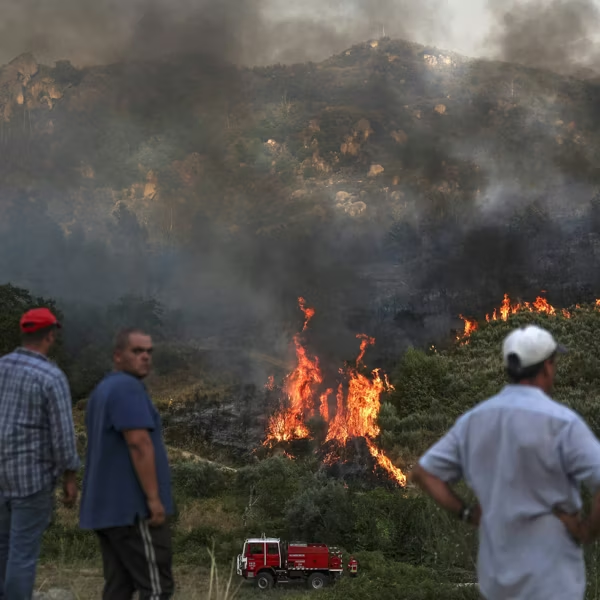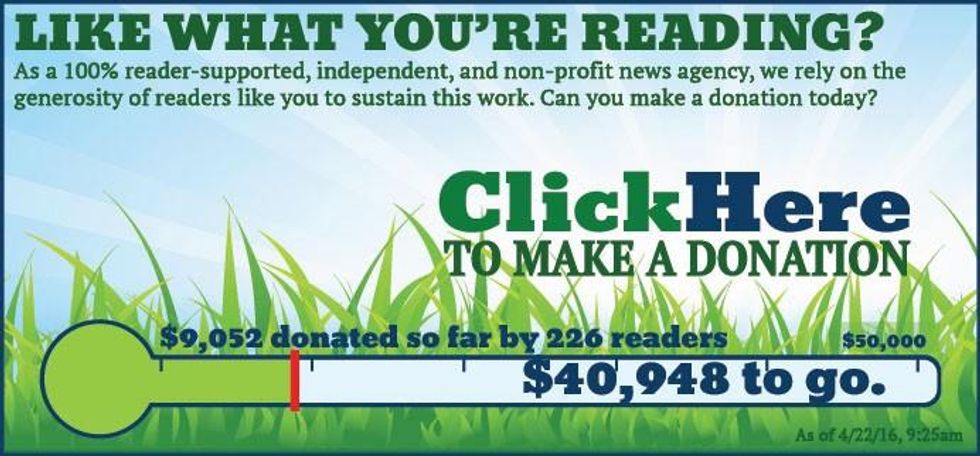US-Funded Conservation in African Rainforests is Resounding Failure: Report
New report finds "current approach to protecting rainforests is not only unfair on local communities, but ineffective in protecting nature"
An international effort by the U.S., the European Union, and other donors to protect Africa's equatorial rainforests is failing and requires a radical change to conserve wildlife and protect surrounding communities, a new report has found.
Despite the high cost of the project, which received hundreds of millions from international donors, conservation efforts in the Congo Basin have not stopped biodiversity from dwindling or militaristic "guns and guards" from threatening the livelihoods of local populaces, the UK-based Rainforest Foundation (RFUK) revealed on Thursday.
Researchers spent 18 months interviewing people in Cameroon, the Central African Republic, the Democratic Republic of Congo, Gabon, and the Republic of Congo, including four detailed case studies outlined in the report, titled Protected Areas in the Congo Basin: Failing both People and Biodiversity (pdf).
They found that poaching remains persistent despite increased restrictions on protected areas and security patrolling by eco-guards, which has led to mammal populations such as elephants, bongos, gorillas, and chimpanzees declining at an "alarming rate."
Meanwhile, there is consistent neglect or violation of mechanisms in place to safeguard the surrounding communities' rights to "lands, livelihoods, participation, and consultation as well as fundamental rights and freedoms, including in the context of conservation," the group found. Communities in several protected areas reported abuse and other human rights violations, particularly by park rangers.
"The current approach to protecting rainforests is not only unfair on local communities, but ineffective in protecting nature," said RFUK executive director and report co-author Simon Counsell. "A new, more sustainable, form of conservation is needed in Africa's rainforests which works with local people to secure their rights and protect their environment, rather than working against them. International donors need to carefully consider whether their support to strict forest preservation is currently effective."
The biggest of those donors is the U.S. Agency for International Development (USAID), which gave at least $110 million between 2004 and 2010, and has pledged to give $50 million more from 2013 to 2018. USAID is closely followed by the EU, which gave $118m between 1992 and 2010.
"Taking into account all the money that has come through organizations such as WWF and WCS (Wildlife Conservation Society) from private donations and foundations, we calculate that probably $400m has been spent on these protected areas in the last 15 years or so, and quite possibly as much as $500m," Counsell told the Guardian.
In light of these systemic problems, RFUK recommends "a shift away from the conventional people-free parks philosophy to one that could approach the remaining Congo Basin rainforests not as pristine nature to be saved from humans, but as biocultural landscapes where local communities are part of the equation."
That includes adopting "a common position committed to rigorously upholding the relevant national and international laws, standards and norms concerning respect of indigenous and community rights in their funding for conservation programs in the Congo Basin," among other recommendations.
Counsell said, "We are calling on those directly involved in protected area management in the Congo Basin to ensure that conservation projects in the region do not cause the displacement or abuse of the rights of some of the poorest people on the planet."
An Urgent Message From Our Co-Founder
Dear Common Dreams reader, The U.S. is on a fast track to authoritarianism like nothing I've ever seen. Meanwhile, corporate news outlets are utterly capitulating to Trump, twisting their coverage to avoid drawing his ire while lining up to stuff cash in his pockets. That's why I believe that Common Dreams is doing the best and most consequential reporting that we've ever done. Our small but mighty team is a progressive reporting powerhouse, covering the news every day that the corporate media never will. Our mission has always been simple: To inform. To inspire. And to ignite change for the common good. Now here's the key piece that I want all our readers to understand: None of this would be possible without your financial support. That's not just some fundraising cliche. It's the absolute and literal truth. We don't accept corporate advertising and never will. We don't have a paywall because we don't think people should be blocked from critical news based on their ability to pay. Everything we do is funded by the donations of readers like you. Will you donate now to help power the nonprofit, independent reporting of Common Dreams? Thank you for being a vital member of our community. Together, we can keep independent journalism alive when it’s needed most. - Craig Brown, Co-founder |
An international effort by the U.S., the European Union, and other donors to protect Africa's equatorial rainforests is failing and requires a radical change to conserve wildlife and protect surrounding communities, a new report has found.
Despite the high cost of the project, which received hundreds of millions from international donors, conservation efforts in the Congo Basin have not stopped biodiversity from dwindling or militaristic "guns and guards" from threatening the livelihoods of local populaces, the UK-based Rainforest Foundation (RFUK) revealed on Thursday.
Researchers spent 18 months interviewing people in Cameroon, the Central African Republic, the Democratic Republic of Congo, Gabon, and the Republic of Congo, including four detailed case studies outlined in the report, titled Protected Areas in the Congo Basin: Failing both People and Biodiversity (pdf).
They found that poaching remains persistent despite increased restrictions on protected areas and security patrolling by eco-guards, which has led to mammal populations such as elephants, bongos, gorillas, and chimpanzees declining at an "alarming rate."
Meanwhile, there is consistent neglect or violation of mechanisms in place to safeguard the surrounding communities' rights to "lands, livelihoods, participation, and consultation as well as fundamental rights and freedoms, including in the context of conservation," the group found. Communities in several protected areas reported abuse and other human rights violations, particularly by park rangers.
"The current approach to protecting rainforests is not only unfair on local communities, but ineffective in protecting nature," said RFUK executive director and report co-author Simon Counsell. "A new, more sustainable, form of conservation is needed in Africa's rainforests which works with local people to secure their rights and protect their environment, rather than working against them. International donors need to carefully consider whether their support to strict forest preservation is currently effective."
The biggest of those donors is the U.S. Agency for International Development (USAID), which gave at least $110 million between 2004 and 2010, and has pledged to give $50 million more from 2013 to 2018. USAID is closely followed by the EU, which gave $118m between 1992 and 2010.
"Taking into account all the money that has come through organizations such as WWF and WCS (Wildlife Conservation Society) from private donations and foundations, we calculate that probably $400m has been spent on these protected areas in the last 15 years or so, and quite possibly as much as $500m," Counsell told the Guardian.
In light of these systemic problems, RFUK recommends "a shift away from the conventional people-free parks philosophy to one that could approach the remaining Congo Basin rainforests not as pristine nature to be saved from humans, but as biocultural landscapes where local communities are part of the equation."
That includes adopting "a common position committed to rigorously upholding the relevant national and international laws, standards and norms concerning respect of indigenous and community rights in their funding for conservation programs in the Congo Basin," among other recommendations.
Counsell said, "We are calling on those directly involved in protected area management in the Congo Basin to ensure that conservation projects in the region do not cause the displacement or abuse of the rights of some of the poorest people on the planet."
An international effort by the U.S., the European Union, and other donors to protect Africa's equatorial rainforests is failing and requires a radical change to conserve wildlife and protect surrounding communities, a new report has found.
Despite the high cost of the project, which received hundreds of millions from international donors, conservation efforts in the Congo Basin have not stopped biodiversity from dwindling or militaristic "guns and guards" from threatening the livelihoods of local populaces, the UK-based Rainforest Foundation (RFUK) revealed on Thursday.
Researchers spent 18 months interviewing people in Cameroon, the Central African Republic, the Democratic Republic of Congo, Gabon, and the Republic of Congo, including four detailed case studies outlined in the report, titled Protected Areas in the Congo Basin: Failing both People and Biodiversity (pdf).
They found that poaching remains persistent despite increased restrictions on protected areas and security patrolling by eco-guards, which has led to mammal populations such as elephants, bongos, gorillas, and chimpanzees declining at an "alarming rate."
Meanwhile, there is consistent neglect or violation of mechanisms in place to safeguard the surrounding communities' rights to "lands, livelihoods, participation, and consultation as well as fundamental rights and freedoms, including in the context of conservation," the group found. Communities in several protected areas reported abuse and other human rights violations, particularly by park rangers.
"The current approach to protecting rainforests is not only unfair on local communities, but ineffective in protecting nature," said RFUK executive director and report co-author Simon Counsell. "A new, more sustainable, form of conservation is needed in Africa's rainforests which works with local people to secure their rights and protect their environment, rather than working against them. International donors need to carefully consider whether their support to strict forest preservation is currently effective."
The biggest of those donors is the U.S. Agency for International Development (USAID), which gave at least $110 million between 2004 and 2010, and has pledged to give $50 million more from 2013 to 2018. USAID is closely followed by the EU, which gave $118m between 1992 and 2010.
"Taking into account all the money that has come through organizations such as WWF and WCS (Wildlife Conservation Society) from private donations and foundations, we calculate that probably $400m has been spent on these protected areas in the last 15 years or so, and quite possibly as much as $500m," Counsell told the Guardian.
In light of these systemic problems, RFUK recommends "a shift away from the conventional people-free parks philosophy to one that could approach the remaining Congo Basin rainforests not as pristine nature to be saved from humans, but as biocultural landscapes where local communities are part of the equation."
That includes adopting "a common position committed to rigorously upholding the relevant national and international laws, standards and norms concerning respect of indigenous and community rights in their funding for conservation programs in the Congo Basin," among other recommendations.
Counsell said, "We are calling on those directly involved in protected area management in the Congo Basin to ensure that conservation projects in the region do not cause the displacement or abuse of the rights of some of the poorest people on the planet."


